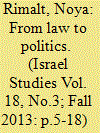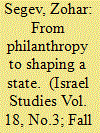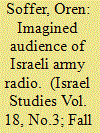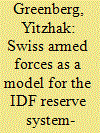|
|
|
Sort Order |
|
|
|
Items / Page
|
|
|
|
|
|
|
| Srl | Item |
| 1 |
ID:
123871


|
|
|
|
|
| Publication |
2013.
|
| Summary/Abstract |
For several decades Israeli feminism focused on law in its efforts to promote greater gender equality in Israel. The common wisdom was that legal reforms provide the most effective tools for undermining social structures of inequality and empowering women in the public sphere. Over the years this understanding motivated numerous legal battles that were aimed at using the law as an agent of gender equality. Starting in the 1980s various female litigants, aided by civil rights and feminist organizations, approached the Supreme Court as part of their efforts to remedy injustices of discrimination. For example, Leah Shakdiel, backed by ACRI, was a pioneer in the 1980s in securing women the right to equal membership in municipal rabbinical administrations; Neomi Nevo headed a feminist effort to amend retirement policies in Israel and eventually guaranteed women the right to retire at the same age as men; Alice Miller's efforts to become a military pilot a decade later initiated major legal reforms in military policies toward women that enabled them to serve in various combat roles.
|
|
|
|
|
|
|
|
|
|
|
|
|
|
|
|
| 2 |
ID:
123879


|
|
|
|
|
| Publication |
2013.
|
| Summary/Abstract |
Rose Jacobs and the organization among whose leaders she numbered-Hadassah, the American Women's Zionist organization-made, during the 1930s and 1940s, important and unprecedented inroads into the Zionist establishment. Jacobs and other Hadassah women used their organization's size and financial power to claim a voice in the making of Zionist policy both in the United States and in the Jewish community in Palestine. The political, international, and economic crises of these two decades enabled Hadassah to expand out of the traditionally female areas to which it had originally been restricted-health and education-and make its voice heard on other issues, among them Jewish-Arab relations. This culminated in Jacobs' election to the Jewish Agency Executive in 1938. Hadassah broke the limitations under which Jewish women's organizations had theretofore operated and used its newfound influence to offer alternatives to the male Zionist leadership's cultural, social, and political doctrines.
|
|
|
|
|
|
|
|
|
|
|
|
|
|
|
|
| 3 |
ID:
123875


|
|
|
|
|
| Publication |
2013.
|
| Summary/Abstract |
Since 1950, the Israel Defense Forces has operated the Galei Tzahal radio station, which broadcasts to the general public. Over the years, substantial changes have taken place in the station's programming, as it grew from a marginal broadcasting body into a major radio station with high ratings. This study examines a particular aspect of the station's history-its imagined audience-and the fundamental changes in the perception of that audience over time.
|
|
|
|
|
|
|
|
|
|
|
|
|
|
|
|
| 4 |
ID:
123874


|
|
|
|
|
| Publication |
2013.
|
| Summary/Abstract |
A country's official memory of a conflict in which it is involved is of great importance. One of the main presenters of that memory is the Ministry of Education, through the history and civics textbooks it approves for use in its educational system. This article explores for the first time the content of Israeli textbooks approved from 1959 through 2004 regarding one of the main events in the Israeli-Palestinian conflict-the 1948 Palestinian exodus. Did the textbooks present a Zionist narrative regarding the causes of the exodus (willing flight of the Palestinians), or a critical narrative (willing flight accompanied with expulsion)? Methodologically, the article uses content analysis of all the relevant textbooks, as well as interviews with senior staff at the Ministry and other appropriate figures. The research found that this official memory was dramatically transformed from being initially totally Zionist to eventually being totally critical, since 2000. Other aspects of this memory are also explored such as the reasons behind the presentation of these narratives, the external and self-censorship mechanisms that mediate the impact of these reasons, the manifestation and consequences of these mechanisms, as well as the modus operandi of the Ministry.
|
|
|
|
|
|
|
|
|
|
|
|
|
|
|
|
| 5 |
ID:
123873


|
|
|
|
|
| Publication |
2013.
|
| Summary/Abstract |
Israeli law still contains the tender years presumption, according to which children under the age of 6 should live with their mother in cases of parental separation, unless special circumstances require a different custody arrangement. In many other developed countries, this presumption was abolished during the last two decades of the twentieth century, among other reasons due to aggressive campaigns by men's organizations. In these countries, the presumption was replaced with gender neutral legal language, encouraging shared legal parenthood and blurring the distinctiveness of the role of the primary care-giving parent by replacing the terms "custody" and "visitation" with terms such as "parental plan" and "contact". Similarly, at the end of 2011, a governmental committee (hereinafter: the Shnit Committee) recommended abolishing the tender years doctrine and adopting the terms "parental responsibility" and "parental times". These recommendations were embraced by the Minister of Justice, and are awaiting parliamentary discussion.
|
|
|
|
|
|
|
|
|
|
|
|
|
|
|
|
| 6 |
ID:
123878


|
|
|
|
|
| Publication |
2013.
|
| Summary/Abstract |
Cultural texts take an important part in constructing a society's collective narrative. They play an even greater role in shaping the ethos of conflict and culture of conflict of societies enrolled in an ongoing conflict. The article focuses on Israeli films produced in the last three decades that deal with the Israel-Lebanon conflict. It is claimed that although criticizing the national narrative, these films also work to preserve and support it further. The movies are able to turn against the national narrative and require its continuation at the same time by framing the Lebanon situation as a one-time event that has ended, and isolating it from other aspects of the Israeli-Arab conflict; by forming soldier brotherhood unity; and by dissociating the soldiers' acts and their knowledge of the events from the conflict in which they take part. It is therefore claimed that, as opposed to the common scholarly perception that Israeli films abandoned their support of the national narrative in the late 1970s, they actually found new ways to preserve it.
|
|
|
|
|
|
|
|
|
|
|
|
|
|
|
|
| 7 |
ID:
123872


|
|
|
|
|
| Publication |
2013.
|
| Summary/Abstract |
This part of our roundtable argues that gender segregation in Israel is a form of sexual harassment under Israeli Law, as well as a self-defeating policy from the perspective of Orthodox religious principles. Analyzing the case of gender segregation in public transportation in certain cities in Israel, I shall demonstrate that gender-segregated seating arrangements in Israeli buses constitute "an intimidating or humiliating reference directed towards" women's sex or their sexuality. Therefore, such segregation constitutes prohibited sexual harassment pursuant to Section 3(5)(a) of the Prevention of Sexual Harassment Law, 5758-1998. I also argue that the current wave of Jewish religious fundamentalism, with its relatively new demands concerning women's modesty, is self-defeating. While its motivation is to "clean" the public sphere from any manifestation, real or perceived, of female sexuality, by being so preoccupied with women's "modesty" it in fact puts their sexuality at the center of attention.
|
|
|
|
|
|
|
|
|
|
|
|
|
|
|
|
| 8 |
ID:
123877


|
|
|
|
|
| Publication |
2013.
|
| Summary/Abstract |
Among military personnel who were present at the birth of the Israel Defense Forces (IDF) and among researchers, there is a widespread opinion that the influence of the Swiss armed forces can be seen in the system according to which the IDF was constructed after the War of Independence. That is, armed forces based on the model of a militia. A comparison between the IDF and the Swiss armed forces reveals that in Israel, as in Switzerland, the concept of a fighting nation was adopted; that is, universal conscription to compulsory service and the obligation of reserve duty for discharged soldiers, and that it is indeed possible to identify the influence of Swiss military organization in the organizational contours of the reserve service within the IDF. But a fundamental difference can be seen between the two armed forces. In contrast to the militia-type armed forces in Switzerland, the IDF was structured as a small regular army that included regular combat units as well as reserve forces comprising most of the ground forces. This difference between the IDF and the Swiss armed forces is rooted in Israel's geostrategic circumstances, the military threats it faces, and its need to ensure wide security margins, that is, an appropriate level of readiness and preparedness.
|
|
|
|
|
|
|
|
|
|
|
|
|
|
|
|
| 9 |
ID:
123880


|
|
|
|
|
| Publication |
2013.
|
| Summary/Abstract |
The teaching of Israel at American universities has grown dramatically in recent years and has become "normalized" in the curriculum. A census was conducted at 316 schools to assess 2011-2012 course offerings related to Israel in order to analyze growth over time, characteristics of courses, and institutional characteristics that contribute to growth. Results indicate a small increase in Israel-focused courses between 2008-09 and 2011-12, following a two-thirds increase from 2005-06 to 2008-09. Courses were offered under a variety of disciplinary auspices including Jewish studies, political science, history, Hebrew, and other fields. The number of courses offered remained strong particularly at more prestigious schools with large Jewish populations. External support from programs that place or train qualified faculty yield more courses about Israel at their respective institutions, but the effect cannot persist without the continued presence of those faculty. A key focus of further research is to understand the impact of Israel courses on students and discourse about Israel.
|
|
|
|
|
|
|
|
|
|
|
|
|
|
|
|
|
|
|
|
|